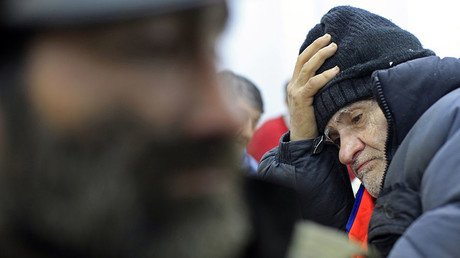‘Robot’ activists in Switzerland demand guaranteed income for all humans (VIDEO)

A “robot rally” has taken place in Zurich, with more than 100 activists wearing cardboard costumes in the streets as part of a major call for the introduction of Unconditional Basic Income (UBI) in Switzerland.
The Swiss are set to go to the polls on June 5 in a referendum on a guaranteed income for everyone. The sum proposed stands at 2,500 Swiss Francs ($2,500). The Swiss people will be voting on a new article in the country’s constitution which stipulates that the federal government would have to implement the UBI with an “amount high enough for people to live off in dignity.”
According to the organizers of the first rally of its kind in the world, activists from the Unconditioned Basic Income (BGE) movement, claim that the main idea of an UBI is to secure the basic needs of human life unconditionally. Calling themselves “the robots”, they argue that humans should be free and not struggle for basic income.
“We want to work for the humans to relieve them from the struggle for income. We are really good in working. But we do not want to take away people’s jobs and thereby bring them into existential difficulties,” a BGE declaration adopted earlier this year reads.
Fearing that soon the dangers of robotization in the workforce will cost humans their jobs, the “robots” decided to play an active role in defending the idea to introduce “an Unconditional Basic Income for all humans.”
“I beg of you, dear human friends, go out and fight for the unconditioned basic income. Convince your friends that we robots are not enemies but friends. Because it is you who created us,” one robot said at the rally.
Despite strong robotic advocacy, according to Friday’s poll by Swiss Broadcasting Corporation, the push for a basic income safety net will be rejected in June. Currently only 24 percent support the idea, while 72 percent oppose it.
“Despite a most interesting campaign, the promoters don’t stand a chance with their ideas, even if it is the first nationwide vote on such an issue,” Claude Longchamp, head of the GfS Bern institute, told Swiss Info.













